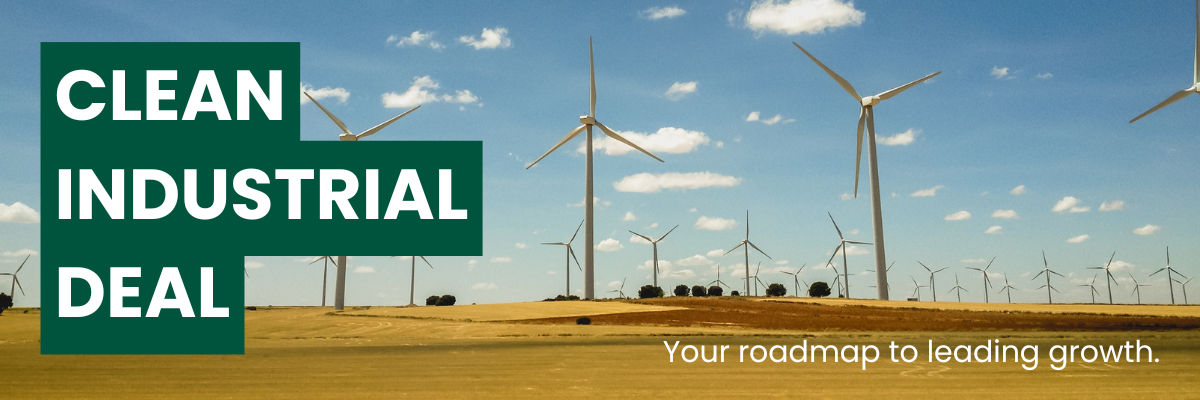
Written by Eliza Druta
Dear reader,
Welcome to Publyon’s monthly sustainability newsletter. As the second half of 2025 begins, Brussels is pushing forward with major policy moves linking competitiveness, security, and sustainability. Taking the helm of the Council of the EU, Denmark has launched its Presidency under the motto “A Strong Europe in a Changing World”, placing clean energy, climate targets, and smarter regulation high on the agenda.
Meanwhile, the Commission has released its Water Resilience Strategy, tackling Europe’s growing water stress and PFAS pollution. The Green Claims Directive has unexpectedly returned to the legislative table after political pushback, and the new Defence Omnibus brings significant regulatory exemptions, particularly for chemicals used in defence.
Curious about what’s ahead for the EU’s green and industrial agenda? Let’s dive in.
Europe’s bold plan for sustainable growth, the “Clean Industrial Deal”, represents a major shift for EU businesses, especially in energy-intensive sectors. Don’t miss your chance to engage with the Commission to shape this deal and influence the policy direction for the next five years.

The spotlight
The Danish Presidency puts competitiveness and the green transition centre stage
On 1 July, Denmark assumed the Presidency of the Council of the EU under the motto “A Strong Europe in a Changing World.” Over the next six months, Copenhagen aims to strengthen the EU’s resilience, security, and competitiveness—while keeping sustainability at the core.
The Danish Presidency sees the green transition as a key lever for economic growth. Priorities include strengthening Europe’s clean energy production and infrastructure, reducing regulatory burdens on businesses, and ensuring access to affordable renewable energy. Denmark will also lead negotiations on the EU’s 2040 climate target, with a view to offering clarity for businesses and showcasing European climate leadership ahead of COP30.
Under the tagline “A competitive and green Europe”, the Danish Presidency is positioning sustainability as a pillar of long-term European competitiveness.

Impact analysis for your business
Our free updates keep you informed, but is that enough? With our tailored sustainability updates you’ll receive:
- Custom insights on how upcoming policy changes might impact your business;
- Strategic advice from your dedicated policy consultant on how to turn challenges into opportunities;
- Early warnings about key legislative developments.

Policy updates
Commission unveils first-ever EU Water Resilience Strategy
On 3 June, the European Commission published the new Water Resilience Strategy, meant to prepare Europe for a future with ever higher water scarcity. The strategy outlines initiatives that the European Commission will focus on in the coming months and years, crucial for businesses as it offers clarity into what they should prepare for. The European Commission is committing to technological innovation and will apply the polluter pays principle to prevent the spread of so-called “forever chemicals” (PFAS). In 2026, a public-private partnership will be launched to focus on the detection and remediation of PFAS and other persistent substances. These efforts are in line with other recently revised EU legislation, allowing companies to start preparing themselves for the water scarce future.
Green Claims Directive revived after political backlash
On 24 June, the Commission reversed its decision to withdraw the draft directive on environmental claims. This was in response to growing political opposition, particularly from the right wing of the European Parliament. The directive aims to protect consumers from misleading environmental marketing practices. Companies wishing to use environmental marketing claims in Europe would have to obtain prior approval from nationally recognised verifiers. The Commission indicated that it may not withdraw the directive if micro-enterprises are excluded from the rules. Negotiations between the Council and the European Parliament can therefore resume, as long as they respect the Commission’s wishes. The European Parliament is divided on the directive. The Christian Democratic EPP group is opposed and, together with the right-wing parties, has a possible majority.
Defence Omnibus Package to exempt defence sector from key chemical rules
On 17 June, the European Commission published the Defence Readiness Omnibus, simplifying the regulatory framework for defence and transport of military personnel/goods. With this 4th omnibus package, the Commission aims to boost the defence industry and ensure the EU is ready for the new geo-political reality it now must face. Within the omnibus, not only defence regulation is amended however. The Commission has also decided to simplify chemical regulations such as REACH (Registration, Evaluation, Authorisation and Restriction of Chemicals), giving a full exemption to defence related usage. Other chemicals legislation will also be amended, including the CLP (Classification, Labelling and Packaging of substances and mixtures), Biocidal Products, and POPs (Persistent Organic Pollutants) regulations.

Events
Find a detailed overview of Brussels’ main sustainability-related events that you absolutely should join this month.
- 9 July, Bruegel ThinkTank: EU Nature Restoration Law: How can EU countries restore ecosystems while balancing budgets?, Bruegel, Rue de la Charité 33, 4th floor, 1210 Brussels
- 10 July, 4WARD Global Climate & Sustainability: Networking Meetups, Madeleine Theatre, Brussels



